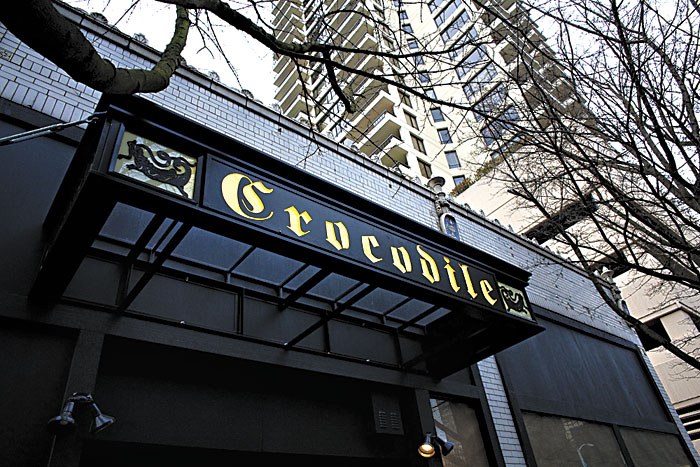“I keep going back and forth between being really happy and very sad,” said Crocodile sound engineer Jim Anderson, squeezing my hand over the wide, strategically bowed Plexiglas shield protecting his new soundboard. It’s the long-awaited opening night at the dramatically revamped Belltown institution, and everyone’s emotions are running the gamut from sentimental to euphoric—mine included. Local band the Quiet Ones have just taken the stage, and despite their assertion that they are the first band to play the new stage, it actually had been informally christened two hours earlier during a private reception for friends and family by members of The Minus Five and a visiting Robyn Hitchcock, all longtime regulars on the Crocodile stage since its inception in 1991.
When earlier that evening I’d first walked into the club via its new Blanchard Avenue entrance, I turned the corner and immediately encountered Kinski’s Chris Martin and Lucy Atkinson tucked comfortably into a high-backed black leather booth in Via Tribunali, the local artisan pizza outpost occupying the Croc’s former back bar. Martin and Atkinson are sitting with Frank Nieto of 230 Publicity. Kinski played the old Croc more times than I can count and Nieto used to be the venue’s jovial PR jockey, so I grab a seat with them out of comfortable familiarity.
After eventually getting up to survey the reconstructed surroundings, I was both impressed and wildly disoriented. The design choices are chic and smart, reflective of proprietors who want to create an artist-friendly venue miles away from the space’s humble origins as a scruffy rock club. The removal of the dropped ceiling, which now allows the eye to soar considerably higher, is probably the most immediately striking difference, followed by the introduction of a second-tier mezzanine above the repositioned stage (which now resides along the club’s north wall). Much of the discussion among reception guests revolved around the pristine, white-tiled bathrooms and the gracious nods to the past, including a mini-gallery of framed show posters in the stairwell leading to the upper bar and the repurposing of the previously sightline-sabotaging post as a support beam. However, as Anderson articulated to me later, “If you look closely, you can see the outline of the old Crocodile, but really the only thing the same is the address.”
Anderson is right, but whether that’s cause for further mourning ultimately depends on whether nostalgia trumps practicality, and from my perspective it does not. Physically and fiscally, the club could not have continued to operate in the state of disrepair it was in when it was abruptly shuttered in late 2007. And although they suffered from a few opening-weekend snafus (namely running out of beer the first night, losing an understandably distraught Barsuk Records employee’s credit card the next night, and later encountering some unfortunate backstage plumbing problems), the bottom line was that the room sounded fantastic and the bands enjoyed themselves—even though some are more cautiously embracing the new Crocodile’s slicker surroundings.
“Playing there and being there were two different things,” explained Akimbo guitarist Aaron Walters when I spoke with him after his band headlined at the club on Friday night. “Aesthetically it didn’t do it for me at all, and I miss the vibe—the old Croc was dripping with it—but it sounded better. Jim Anderson is a super-ninja and the [backstage] band accommodations were really nice. It is better; it’s just going to take a while [to feel] homey.”
Another Seattle music icon is enjoying its own phoenix-like status this week: On Tuesday, March 24, Pearl Jam unveiled a deluxe reissue of their landmark debut, Ten. The reissue is offered in four different incarnations, all of which include both a digitally remastered version of the original track listing and a new rawer, sparser remix by the band’s long-time producer, Brendan O’Brien, that includes six bonus tracks.
“It came out great,” says guitarist Mike McCready of the remix when I reach him via cell in Huntington Beach, Calif., where the band is working on their next studio album (slated for a fall release). “It kind of reminds me of how we were live back then. It’s a lot starker, faster, and heavier.” This reissue is part of a two-year catalogue re-release campaign leading up to the band’s 20th anniversary in 2011, when they also hope to release a Cameron Crowe–helmed cinematic chronicle of their career. “We are just in the very early stages of that…starting to go through all the footage we have, and Cameron’s writing the treatment,” McCready explains.
Looking back on all that history and the astonishing success of Ten, McCready sees it primarily as the gateway that allowed Pearl Jam to enjoy the creative autonomy they maintain to this day. “The record was a monumental time in my life. I was working [as a prep cook] at Julia’s and Piecora’s Pizzeria, then the record came out and it was life-changing. It got bigger than anything I could have ever expected. And along with that came the criticism and too much partying, so it’s a mixed bag. But the great thing is, it allowed us to have control over our music from there on out.”








